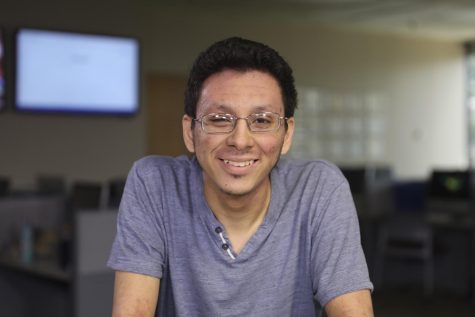SGA town hall brings attention to student issues
September 20, 2018
After a year of budget cuts and student-service rollbacks, SGA hosted a town hall on Sept. 18 to address student grievances about how the university’s financial situation has affected the student experience. The town hall was centered on the topics of food insecurity, work study, library hours and the shuttle service.
Many students brought suggestions to help combat food insecurity on campus, including the OR extending its hours, having more food options available for students on the weekend and allowing students to donate meal swipes.
A committee of students, faculty and staff has been meeting bi-weekly since late August, brainstorming ideas to combat food insecurity on campus, according to Alicia Bourque, interim director of student affairs.
“What we’re doing currently is looking into expanding the current food pantry and gaining community partnerships, like Second Harvest, so that we can stock our food pantry and have it open and available to students on a more regular basis,” said Bourque. “We’re also looking at students being able to donate meal swipes.”
The food pantry, which is currently open in the box office of the Music and Fine Arts building from 12:20 p.m. to 1:30 p.m. on Tuesdays, Wednesdays, and Fridays, will be moving to a more centralized location soon, according to Bourque.
When several students questioned the library hours, they were told that the library faculty and staff is doing its best to have the library back to the same hours as last semester by the end of the month, according to Deborah Poole, dean of libraries.
Poole also said that the library staff is also taking the suggestion for 24-hour days into consideration.
Many of the student concerns voiced in the town hall involved miscommunication between faculty and students regarding work study. Sixty-six students submitted appeals after being denied work study for the 2018-2019 school year and 59 were approved, according to Maria Calzada, interim provost.
“A student cannot get more than 100 percent of the amount assigned to them by FAFSA,” Calzada said, in response to why many students lost their work study in the first place.
Elizabeth Rainey, director of the Student Success Center, said that while she understands students’ frustration, students, while in college, are responsible for budgeting and managing their money.
“Student financial wellness is also about students spending their money wisely,” Rainey said.
Calzada acknowledged that the university is working on developing more direct streams of communicating with students on issues like financial aid.
“We are happy to look into how we communicate with students in the future,” Calzada said.
In addition to work study woes, the new shuttle service was deemed unreliable by some Cabra Hall residents who said the shuttle has made them late for classes and worried about getting to and from campuses safely.
The residential life faculty is working on improving the transportation route to avoid students being late to classes according to Amy Boyle, director of residential life.
When several students voiced safety concerns about waiting extended periods of time for the shuttle, the panel advised students to call LUPD if they are waiting for a shuttle for more than 30 minutes.
Sierra Ambrose, SGA president, said SGA will continue to hold themed town halls so students can directly voice their concerns to faculty and help spur change. The importance of the town hall reflects Ambrose and Joann Cassama’s, SGA vice president, initiative to have more transparency between the faculty and staff.
“I want every student to come here and say exactly what they’re feeling about each concern,” Ambrose said. “Students should just be present and show their enthusiasm and passion for the university, that they care and that they want the university to be held accountable.”
Whitney McBay, criminal justice freshman and First Year Council member, said that even though the school year started off smoothly, she was excited for the opportunity for the students to give their feedback to the administration.
“The town hall is a rare opportunity where you have an event specifically to directly express your concerns to the administration of a school,” she said. “How else will they know what else needs to change if no one tells them?”
Calzada said the university received valuable feedback at the town hall and will be making plans to improve the student experience moving forward.
“The feedback from students is important and they need to know that we are offering the services that students need and that we are effective in our communication with students,” she said. “We got a lot of feedback, a lot of things that we can fix, and we’ll get to work.”








